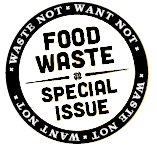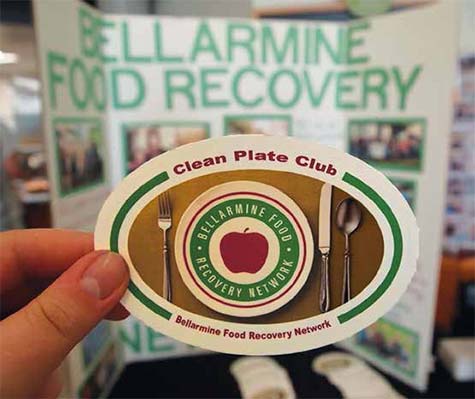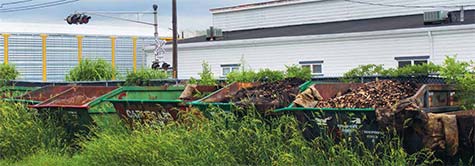Area Schools Take Steps to Reduce Food Waste
A Lesson in Valuing Food
63 million tons.
That’s the amount of food Americans threw in the trash last year, according to ReFED’s Roadmap to Reduce Foodwaste. It is enough food to fill over 1.5  million 18-wheelers and the equivalent weight of over 12 million elephants. The sheer scope of perfectly edible food that is laid to waste day in and day out is staggering, rivaled only by the seemingly formidable challenge of reducing this ever-rising mountain.
million 18-wheelers and the equivalent weight of over 12 million elephants. The sheer scope of perfectly edible food that is laid to waste day in and day out is staggering, rivaled only by the seemingly formidable challenge of reducing this ever-rising mountain.
There is no question that the issue of food waste has reached crisis proportions and the matter is not lost on our local school systems. Thanks to the rising voices of a few dedicated souls, various strategies are currently in action in the Jefferson County Public School system (JCPS) as well as Fayette County Public Schools (FCPS) and area post-secondary institutions like the University of Louisville (UofL) and Bellarmine University.
Tackling waste in a school district like JCPS, which encompasses 147 individual school kitchens, is no small feat. An ally in this effort is the growing movement to bring the garden into the classroom. Both campaigns recognize the importance of food rescue and composting.
We’re all guilty of uttering the phrase “my eyes were bigger than my stomach” after we’ve overloaded our dinner plates. Students Austin Adam and Corbin McGuire were witnessing this often-innocent food overdose every day in the cafeteria of Bellarmine University and it was beginning to wear on their conscience.
Together with two other classmates, they discovered the Food Recovery Network, a national movement established in 2011 at the University of Maryland. The Food Recovery Network currently helps programs at over 150 colleges to carry out their mission of recovering and donating surplus food that would otherwise be thrown in the trash.

Austin and Corbin signed Bellarmine on as the first Kentucky chapter in 2014 and efforts are under way to establish a program at UofL. Corbin, Austin and other volunteers take turns arriving at Bellarmine’s dining hall every evening at 8pm. The Sodexo Food Services staff meets them at the back of the kitchen with trays of all varieties of food ready to be transported to Volunteers of America and Wayside Christian Mission. Corbin said that one of the most profound reminders this work brings her every day is that the face of hunger and homelessness does not just belong to adults. Families with small children fill the shelters they serve.
“I’m not a fun person to eat with now,” chuckled Austin, noting that he sees every meal in terms of what will be wasted. He is determined to only take as much as he needs, no more. This spirit of “waste not, want not” is highlighted once a semester during “scrape the plate” nights. Trash cans are set atop scales and students take turns emptying their food scraps into the bin.
“We’ve never had a scrape the plate night when we’ve collected less than 100 pounds of food waste,” said Corbin — “and that’s just the leftovers.” Corbin and Austin are hoping a system of offering samples will soon be implemented in Bellarmine’s dining hall, allowing students to taste meals before they commit to an entire plate of something they might not want, a plate of perfectly good food that will ultimately go to waste.

Composting bins at the University of Louisville. Photo by Lindsey McClav
The educational component of food waste in our schools is paramount and a worthy challenge. JCPS has found early success in promoting the idea of “offer, not serve.” In the early days of their breakfast in the classroom program, protocols required all components of the breakfast to be preset at each child’s seat. Once an item is “served” it is considered perishable and, if it is a nonshelf- stable product like milk, it often may not be recycled to another hungry individual, even if it hasn’t been opened. Milk has quickly risen to the top of the food waste pile in JCPS, with so many cartons left over that Kentucky Harvest, a Louisville-based nonprofit that distributes food to shelters throughout the city, will often decline to take them as they cannot find homes for them and holding space is so limited.
Kentucky Harvest does collect leftover food from cafeteria service lines daily, visiting each school in the JCPS system and ensuring any remaining food goes to feed the community. In an effort to curb the waste, JCPS now offers milk and other food to students in lieu of serving it outright. Signs now decorate many school cafeterias encouraging students to take only what they can eat, while still promoting the balanced meal guidelines in place across the nation.
Success is evident in the decline of the amount of food donated to Kentucky Harvest year over year, with $174,000 in food from the 2013–14 school year dropping to $153,000 in 2014–15.
We know that plenty of good food ends up in the trash, but that doesn’t mean it lacks value. Indeed, turning food scraps into compost gold is a vital practice in sustainability. Dedication to this method of tackling food waste is best exemplified by Brian Barnes, director of UofL’s composting project. Brian and his team of volunteers compost an average of 2,500 pounds of pre-consumer food waste per week.
Tucked off of the corner of Lee and Floyd Streets, you will discover a line of old dumpsters finding new life as compost bins, each one rife with food waste and worms assisting in the various stages of decomposition. The resulting rich soil is donated to various organizations in the city and used on the university’s landscape beds.
Through a partnership with Heine Brothers Coffee and UofL’s EcoReps program, the self-sustained composting efforts at UofL have continued to grow and Brian hopes to see the project expand, as they are only managing a fraction of the waste produced by UofL’s 20,000-plus students. Additional efforts include a new resident hall composting initiative, set to kick off in 2017.
Integrating the educational aspects of composting into dayto- day classroom life is a priority for Tresine Logsdon, the energy and sustainability curriculum coordinator for Fayette County Public Schools (FCPS). Vermicomposting projects are in place in 50% of the elementary schools within FCPS and, as a charter member of the Green Schools Alliance District Collaborative, FCPS aims to make the three designated pillars of sustainability — environmental literacy, energy efficiency and student wellness — paramount in the classroom. Tresine’s work with the Green Schools Alliance, an international collaborative of sustainable schools, reaches beyond the state and has offered her the chance to share ideas and learn from school districts throughout the nation.
“We are developing a longterm plan” said Tresine, and she is dedicated to reducing energy consumption and food waste both in FCPS and across the nation.
6,500 pounds and 110 tons. These numbers represent the amount of food the Food Recovery Network at Bellarmine has donated over the past two years and the waste Brian and his crew of student volunteers at UofL composted in the past year, respectively. These numbers may be small when compared to the 63 million tons of waste our country collects in a year’s time; however every contribution makes a difference.





